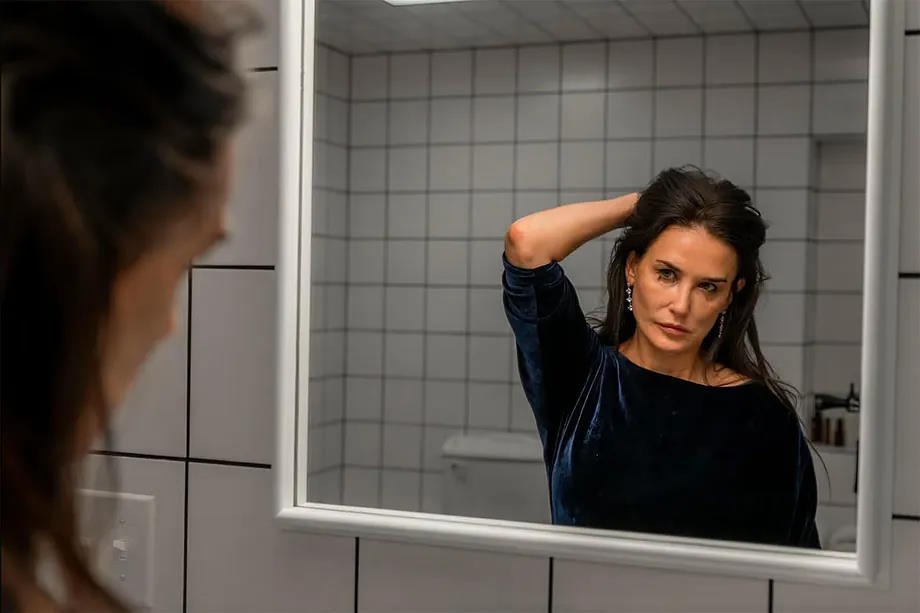The Substance is not just any movie. It is not even just a movie. In truth, it is two: one starring Margaret Qualley and the other, Demi Moore. Both bring the same character to life in two different bodies, which are also two ways of understanding life and cinema. The Substance, premiering this Friday after making waves at Cannes, is a horror and social drama film; it is gore cinema and feminist proclamation; it is a structured reflection on beauty and pure, unabashedly ugly fun. Its director Coralie Fargeat, is indeed a single person, but with ideas so clear and resolute that they could very well be 100,000. And so on.
"The body determines everything," says the director to give meaning to the most basic aspect. She says this on the terrace of a luxury hotel in Cannes where bodies, precisely, look smooth, shiny, and in perfect display condition. She continues: "We spend our whole lives terrified by the mutations of the body. Especially women. We spend a good part of our lives studying how to improve it, how to change it, how to make it strong... In reality, it's as if we wanted to escape from it. Humanity is defined by its worship of a body that we adore and yet can never fully control." The Substance, hence the quotation marks, is what time and Cronenberg, among others, have come to call body-horror. But not only that, in its wildest sense, it is a full-fledged eucharist of flesh on bone, of a body that composes, recomposes, and decomposes.
It tells the story of an aging movie star. And here is Demi Moore in the lead role ready to put the viewer in a state of alarm or astonishment (what could have driven Lieutenant O'Neil to engage in such a raw self-portrait, not just cruel?). Until one day she receives a message with an offer: to duplicate herself into someone much more beautiful, much younger, much more smiling, and much more bodied. Such are the ways of passing time. Her doppelgänger will be Margaret Qualley. However, as is customary in every fairy tale (it is also that), there are rules to follow, such as returning before 12 or not asking for more than three wishes. When one sleeps, the other is awake. And on a weekly basis. Any violation of the rule will harm (age) the replica, which, in truth, is not one. Because the most important thing is simple: never forget that despite being two, they are truly the same person.
The director recounts that she has always felt observed. And she tells this essentially for being who she is and for being a woman. "A woman's body is never just a body, it is always under scrutiny," she says. She also recounts that upon turning 40, she felt a collapse associated with the former. "I felt like I suddenly disappeared," she adds. And as she recounts, she makes explicit each of the motivations that led her to the very essence of The Substance after surprising to the extreme with Revenge (2017), her first film.
"I think what motivated this film was the need to see everything explode. You stop for a moment, look around, and wonder: How is it possible that we are still where we are in 2024? How is all this crap of abuse and inequality still happening? Let's say it was anger that forced me to make a film like this," she comments, and there is no choice but to agree with her. If Fargeat wanted things, no matter what, to explode, she achieves it. As The Substance progresses, it not only succeeds in being an excessive fable, but also feminist and very disturbing, about everything that makes us worse (sexism, the use of a woman's body, the commodification of intimacy, machismo, or the childishness of entertainment), but in an extremely conscious way, it lets go. And it goes wild. And it turns into sheer madness. But on a grand scale. And it goes boom!
And at this point, the filmmaker Fargeat merges, as it cannot be otherwise, with the activist Fargeat. "There are still many glass ceilings. The one in genre cinema is one of them. We must take a stand and assert ourselves with quota policies. If positive action measures are not taken, gender equality will arrive in 3,000 years," she says, knowing herself to be a pioneer, a reference, and, why not, a dynamiter. "Representing violence realistically does not interest me. My idea is to transcend it through exaggeration and excess; to turn it into a pop tool. That is the way to make terror also a convincing approach to politics," she concludes, leaving no doubt about the fury, the intention, and, as already mentioned, the anger.
The Substance is a film that is truly several things because of Demi Moore, because of Margaret Qualley, and because of each of the explosive bodies (because they explode) of the two.
